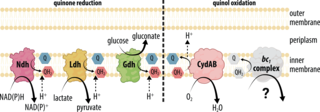Why breathe? To clear the oxygen

Biofuel workhorse uses respiration to protect cells from damage, not capture energy.
The Science
Zymomonas mobilis is a type of bacteria that can grow with or without oxygen, capturing chemical energy through two processes, respiration and fermentation. Because respiration is more efficient, such bacteria typically grow better when oxygen is present. But despite having the genes needed for respiration, Zymomonas grows better without oxygen. Even more puzzling, disrupting respiratory genes actually improved its aerobic growth in previous studies. This has sparked decades of research and debate over the benefit of respiration for this microbe. Here, scientists showed that Zymomonas uses respiration mainly to lower oxygen levels and protect cells from damage rather than to produce energy.
The Impact
Plans to slow climate change call for increased use of sustainable plant-based fuels and chemicals to replace fossil fuels and petrochemicals. One of the keys to this goal is finding microbes that efficiently convert non-food plants into useful products. In order to engineer microbes effectively, scientists must understand how they convert food into energy. Zymomonas is a promising biofuel producer because it is good at fermentation. Scientists hope to improve on it by deleting unnecessary genes. This study suggests that some genes in the respiratory pathway should not be deleted from strains used for industrial production because that would result in microbes that can’t tolerate oxygen, which is difficult to manage in industrial settings.
Summary
Scientists with the Great Lakes Bioenergy Research Center selectively deleted two respiratory genes (ndh and cydAB) from Z. mobilis and showed that deletion of cydAB completely inhibited oxygen respiration and dramatically reduced growth in the presence of oxygen. To test whether oxygen itself was responsible for poor growth in the cydAB mutant, scientists introduced a gene that expresses an enzyme that moves electrons from the energy carrier molecule NADH to oxygen. This restored the bacterium’s ability to respire and grow.
Oxygen can have many negative effects, including formation of reactive oxygen species (ROS), byproducts of oxygen metabolism that can damage cells, or directly inactivating oxygen-sensitive enzymes. These results suggest that the effect of molecular oxygen on enzymes had a greater negative impact than formation of ROS. This indicates that the main role of respiration is reducing the intracellular concentration of molecular oxygen, helping to explain why it is beneficial for Z. mobilis to use electron transport chain complexes that have little capacity to contribute to energy generation for the cell, the final step in the aerobic respiration process.
Contact
Michaela TerAvest
Michigan State University
teraves2@msu.edu